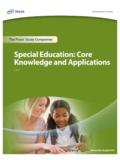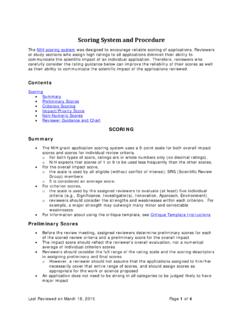Transcription of Facing the challenges of urban poor schools, some ... - ed
1 14 KAPPA DELTA PI RECORD FALL 2005 Facing the challenges of urban poor schools, some teachers defy the odds and achieve increases in student success. What do these teachers know and do?by Rebecca Swanson GehrkeToday, one out of four American children attends school in an urban district; one out of every six American children lives in poverty; and, in urban schools where most of the students are poor, two-thirds or more of the children fail to reach even the basic level of achievement on national tests. urban schools are where most states face the greatest gap between their expectations for students and the reality in terms of resources, achievement, and teacher quality (Olson 2003).
2 Many complex factors impact the improvement of schools in the country s most needy districts and the Rebecca Swanson Gehrke is a Faculty Associate and Research Intern at Arizona State University. Formerly a Special Education teacher in Minnesota and Arizona, her research interest is the preparation and retention of teachers in urban poor KAPPA DELTA PI RECORD FALL 2005 15equalization of education and opportunity for students. This article explores the unique challenges Facing teachers in urban poor schools and provides insight into teacher characteristics and behaviors that increase opportunities for students to demonstrate academic achievement.
3 Perhaps this information, gleaned from research and practice, can contribute to the preparation and retention of quality teachers in settings where they are needed the urban School ContextEffective teaching, as defined by student outcomes and improvement, is a result of the right combinations of methods, materials, student characteristics, teacher characteristics, and the context in which teaching and learning occur. Those assigned or choosing to teach in urban schools, where not only students but also the schools themselves typically have fewer resources than suburban middle-class schools, face a challenge much different from other school environments and perhaps much different from their own schooling experiences.
4 Recent descriptions of urban poor schools continue to include conditions of overcrowding, high turnover of faculty, limited resources, economic differences in salaries and supplies, and a greater number of students at risk for academic failure (Guyton 1994; Quartz 2003; Tredway 1999). Adequate time to address individual student needs is essential in all educational settings; however, the large number of students at risk of academic failure in urban poor schools places heavy demands on the individual teacher s addition to demands on time and resources in urban poor schools, a mismatch exists between the backgrounds of most teachers and the students for whom they are responsible.
5 As in decades past, the preponderance of teachers in all American schools consists of European-American, middle-class females (Diffily and Perkins 2002; Olmedo 1997). Demographic changes and the increase in the diversity of learners, including in the area related to social class, have led to an increasing gap between the backgrounds of students and teachers (Zeichner 2003).The need exists for teachers in urban schools to perform juggling acts with the realities of the context in which they teach or are preparing to teach. Just what is it that enables particular teachers to experience success in some of the nation s most difficult schools?
6 successful TeachersIn reviewing recent research on successful teachers in urban poor schools, three characteristics appear to relate most directly to teachers being effective in those schools. These characteristics are: knowing themselves, knowing the environment in which they teach, and maintaining high Awareness and Self ReflectionThose teaching in urban poor schools must reconcile two factors: their desire to meet students learning needs in an individual, personal manner; and a system that requires uniform conduct, treatment, and outcomes (Weiner 1993; 1999).
7 The demand now is on the teacher to accommodate student diversity in a climate of standardized results. Knowing what works, but being bound by a system that limits the ability of individuals to make curriculum decisions, means that teachers must know themselves in terms of their levels of frustration and their coping capabilities (Weiner 2000). In addition, practicing teachers in urban schools repeatedly mention the need for teachers to be aware of what they believe about urban children s capabilities. Those personal values influence perceptions and ultimately affect teacher expectations and practices (Diffily and Perkins 2002).
8 Teachers need to reflect on their own belief systems and assumptions, especially in instances where their social backgrounds and experiences differ greatly from those of the students they teach (Weiner 1993; 1999). Olmedo (1997) described how teacher educators worked with preservice teachers during their field experiences in urban schools to bring their beliefs and assumptions to a level of self awareness. Activities that improved the preservice teachers self awareness included journaling, composing essays that related readings to practice, and participating in weekly discussions focused on expectations and reflections.
9 These activities helped prepare these preservice teachers to be able to analyze and reflect on the impact of their misconceptions of teaching and learning in an urban poor school and to increase their effectiveness later with their own one s own cultural and social identity also leads to a better understanding of students and their identities and experiences. Subsequently, with this understanding of the perspectives and situations of the KAPPA DELTA PI RECORD FALL 2005 15A mismatch exists between the backgrounds of most teachers and the students for whom they are KAPPA DELTA PI RECORD FALL 2005 nurses, and truancy officers.
10 To this, Honig, Kahne, and McLaughlin (2001) added that teaching can be enhanced by teachers becoming familiar with students neighborhoods, families, and other venues for learning outside of school for instance, where coaches, mentors, or youth counselors influence student essential component of Haberman s (1995a) extensive research in predicting the success of teachers in urban and poverty settings included the ability of such teachers to perform the tasks concerning the care and feeding of the bureaucracy. In large, urban school systems, teachers require the skills and knowledge to cope effectively with paperwork, rules and practice, numerous meetings, interruptions, inadequate materials, lack of time, large classes, and obsessive concern with test scores (Haberman 1995b).














